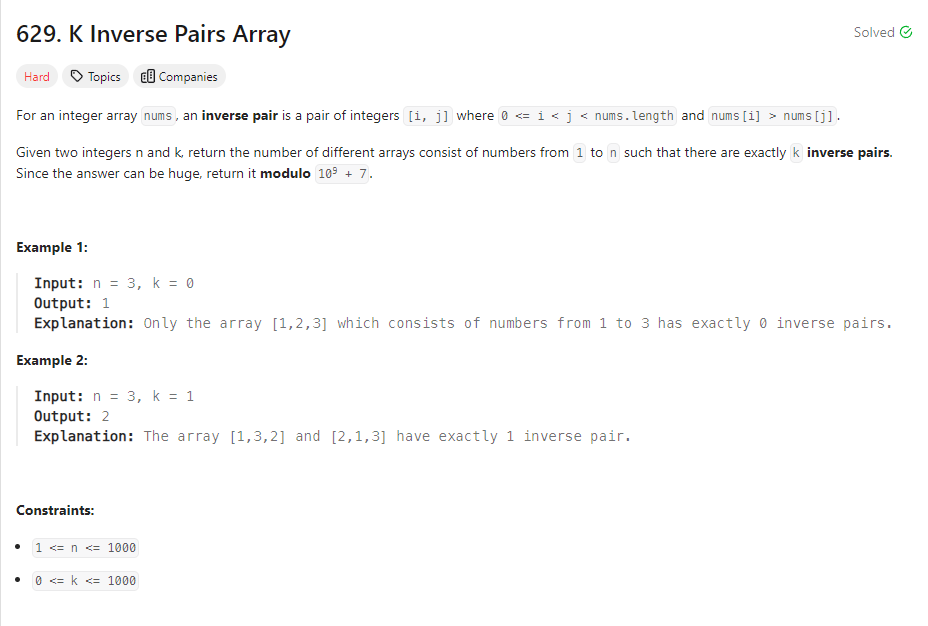Problem of The Day: K Inverse Pairs Array
Problem Statement

Need to review this problem again.
Brute Force - TLE
The idea is that I generated all possible permutations, then check and count for the number of inverse pairs
class Solution:
def kInversePairs(self, n: int, k: int) -> int:
def generate_permutation(idx, nums, perms):
if idx == n:
perms.append(nums[:])
return
for i in range(idx, n):
nums[i], nums[idx] = nums[idx], nums[i]
generate_permutation(idx + 1, nums, perms)
nums[i], nums[idx] = nums[idx], nums[i]
nums = [i for i in range(1, n + 1)]
perms = []
generate_permutation(0, nums, perms)
res = 0
for perm in perms:
count = 0
for i in range(n):
for j in range(i + 1, n):
if perm[i] > perm[j]:
count += 1
if count == k:
res += 1
return res
Cleaner Brute Force - TLE
Instead of generating permuations, the key insight is that adding a new element to an array at a certain position will contribute to the number of inverse pairs based on its placement.
If we know the count of arrays with a size one less and varying inverse pairs, we can determine the count for the current size by considering the placement of the new element. Specifically, adding the new element at the end does not change the count, and adding it at a position p steps from the right increases the count by p.
By iteratively applying this logic, we can compute the count of arrays with a specified size and number of inverse pairs. The approach involves dynamic programming, building up the counts based on smaller array sizes.
Highly recommend to review the official solution on Leet Code for clearer explanation and examples.
class Solution:
def kInversePairs(self, n: int, k: int) -> int:
MOD = 10**9 + 7
def dfs(max_num, pairs):
if pairs < 0:
return 0
if max_num == 0:
return pairs == 0
res = 0
for i in range(max_num):
res = (res + dfs(max_num - 1, pairs - i)) % MOD
return res
return dfs(n, k)
Dynamic Programming - 2D - TLE
Induce from the memoization logic above, we could set up the bottom-up approach or 2d array to cache the previous sub-problems.
class Solution:
def kInversePairs(self, n: int, k: int) -> int:
MOD = 10**9 + 7
dp = [[0] * (k + 1) for _ in range(n + 1)]
for i in range(1, n + 1):
for j in range(k + 1):
if j == 0:
dp[i][j] = 1
else:
for p in range(min(j, i - 1) + 1):
dp[i][j] = (dp[i][j] + dp[i - 1][j - p]) % MOD
return dp[n][k]
- Time Complexity: O(n* k *k)
- Space complexity: O(n * k)
Dymamic Programming 1D Approach - Accepted
Realized that we only needed the previous row, we can further save space and improve space complexity by using just 1D array.
class Solution:
def kInversePairs(self, n: int, k: int) -> int:
MOD = 10**9 + 7
dp = [0] * (k + 1)
dp[0] = 1
for i in range(1, n + 1):
temp = [0] * (k + 1)
total = 0
for j in range(k + 1):
if j - i >= 0:
total -= dp[j - i]
total = (total + dp[j]) % MOD
temp[j] = total
dp = temp
return dp[k]
- Time Complexity: O(n * k)
- Space complexity: O(n * k)
Editorial Solution
Dynamic Programming - 2D
public class Solution {
public int kInversePairs(int n, int k) {
int[][] dp = new int[n + 1][k + 1];
for (int i = 1; i <= n; i++) {
for (int j = 0; j <= k; j++) {
if (j == 0)
dp[i][j] = 1;
else {
for (int p = 0; p <= Math.min(j, i - 1); p++)
dp[i][j] = (dp[i][j] + dp[i - 1][j - p]) % 1000000007;
}
}
}
return dp[n][k];
}
}
Dynamic Programming - optimized - 1D
public class Solution {
public int kInversePairs(int n, int k) {
int[] dp = new int[k + 1];
int M = 1000000007;
for (int i = 1; i <= n; i++) {
int[] temp = new int[k + 1];
temp[0] = 1;
for (int j = 1; j <= k ; j++) {
int val = (dp[j] + M - ((j - i) >= 0 ? dp[j - i] : 0)) % M;
temp[j] = (temp[j - 1] + val) % M;
}
dp = temp;
}
return ((dp[k] + M - (k > 0 ? dp[k - 1] : 0)) % M);
}
}